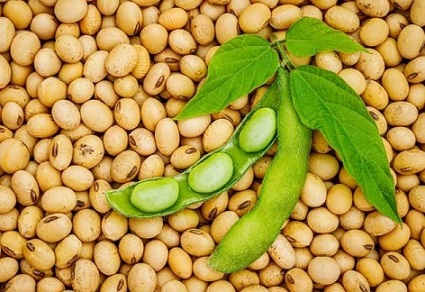Nikhil Prasad Fact checked by:Thailand Medical News Team Aug 07, 2024 1 year, 6 months, 1 day, 22 hours, 46 minutes ago
Influenza News: Influenza remains a persistent global health challenge, causing significant illness and death each year. The virus, especially types A and B, is notorious for its ability to mutate, making the development of effective treatments and preventive measures difficult. Current antiviral drugs, like oseltamivir and zanamivir, have limitations, including the emergence of drug-resistant strains. This
Influenza News report delves into recent research on soybean extract's potential to inhibit influenza virus entry into host cells, offering a promising new avenue for antiviral intervention.
 Soybean extract shows promise in inhibiting Influenza virus entry
The Influenza Challenge
Soybean extract shows promise in inhibiting Influenza virus entry
The Influenza Challenge
Influenza viruses, part of the Orthomyxoviridae family, are responsible for seasonal outbreaks and occasional pandemics. They can lead to severe complications such as pneumonia and encephalopathy, particularly in vulnerable populations like children, the elderly, and those with underlying health conditions. The efficacy of existing drugs is often limited, with resistance becoming an increasing problem. During the 2008-2009 influenza pandemic, 98% of H1N1 strains were resistant to oseltamivir.
Soybean Extract: A Potential Antiviral Agent
Researchers from Mukogawa Women's University in Japan and Osaka Metropolitan University-Japan have been exploring alternative antiviral strategies. Previous studies suggested that certain food extracts, including those from cocoa, onions, and berries, possess anti-influenza properties. Soybean extract, in particular, has shown significant promise. A recent study led by Dr Natsumi Sakata and colleagues, highlights the mechanistic insights into how soybean extract inhibits influenza virus entry.
Methodology
The study utilized Madin-Darby Canine Kidney (MDCK) cells and HeLa cells to investigate the effects of soybean extract on influenza virus entry. The researchers prepared the soybean extract through hot water extraction, followed by filtration and lyophilization. The extract's impact on viral entry was assessed using fluorescence microscopy to observe viral nucleoprotein localization and various assays to evaluate its effect on different stages of viral infection.
Key Findings
-Inhibition of Viral Entry
Soybean extract was found to significantly hinder the entry of the influenza virus into host cells. Fluorescence microscopy revealed that in treated cells, the virus remained on the cell membrane instead of entering the cytoplasm. This suggests that the extract interferes with the virus's ability to penetrate the cell membrane.
-Targeting Clathrin-Dependent Endocytosis
The study identified that soybean extract specifically inhibits clathrin-dependent endocytosis, a primary pathway for influenza virus entry into cells. This was evidenced by a 76% reduction in transferrin uptake, a marker for this pathway, in the presence of so
ybean extract.
-No Effect on Caveolae-Dependent Endocytosis
Interestingly, the extract did not affect caveolae-dependent endocytosis, another pathway for cellular uptake. This specificity underscores the targeted action of soybean extract against influenza virus entry mechanisms.
-Mechanistic Insights
Further analysis showed that the extract does not impede the acidification of endosomes and lysosomes, processes crucial for viral membrane fusion. Instead, it disrupts the early stages of viral infection, particularly the adsorption and internalization stages.
Discussion
The findings from this study are significant as they highlight a novel mechanism by which soybean extract can inhibit influenza virus entry. By targeting the clathrin-dependent endocytosis pathway, the extract offers a specific and effective means to prevent viral infection. This specificity also suggests a lower likelihood of interfering with other cellular processes, potentially reducing the risk of side effects.
Future Directions
The study team suggests that further research is needed to identify the specific components within soybean extract responsible for this antiviral activity. Understanding these components and their interactions with viral entry mechanisms could lead to the development of new antiviral drugs or preventive treatments. Additionally, exploring the efficacy of soybean extract in vivo, in animal models and human trials, will be crucial for its potential application in clinical settings.
Conclusion
The study conducted by Natsumi Sakata and her team provides compelling evidence for the antiviral properties of soybean extract, particularly against influenza virus entry. By inhibiting clathrin-dependent endocytosis, the extract presents a promising alternative to current antiviral drugs, which are often plagued by resistance issues. This research opens new avenues for the development of effective antiviral strategies, underscoring the importance of natural compounds in medical science.
The study findings were published in the peer-reviewed journal: Food Science & Nutrition.
https://onlinelibrary.wiley.com/doi/10.1002/fsn3.4324
For the latest
Influenza News, keep on logging to Thailand Medical News.
Read Also:
https://www.thailandmedical.news/news/melatonin-alleviates-acute-exacerbation-of-copd-induced-by-influenza-virus-infection-by-inhibiting-m1-macrophage-polarization-and-apoptosis
https://www.thailandmedical.news/news/cinnamon-the-natural-remedy-for-flu-infections-and-beyond
